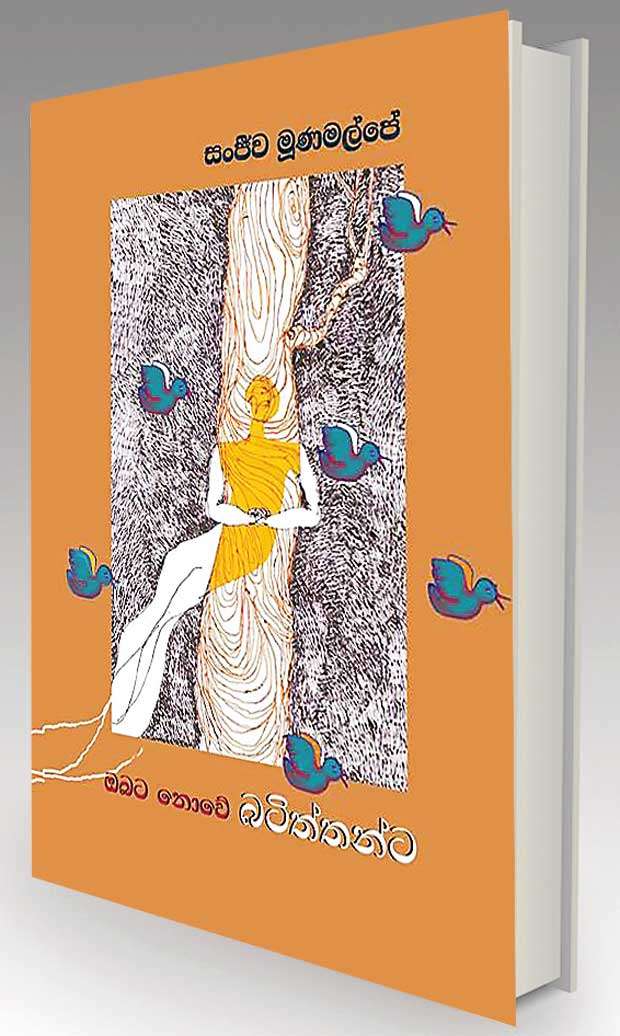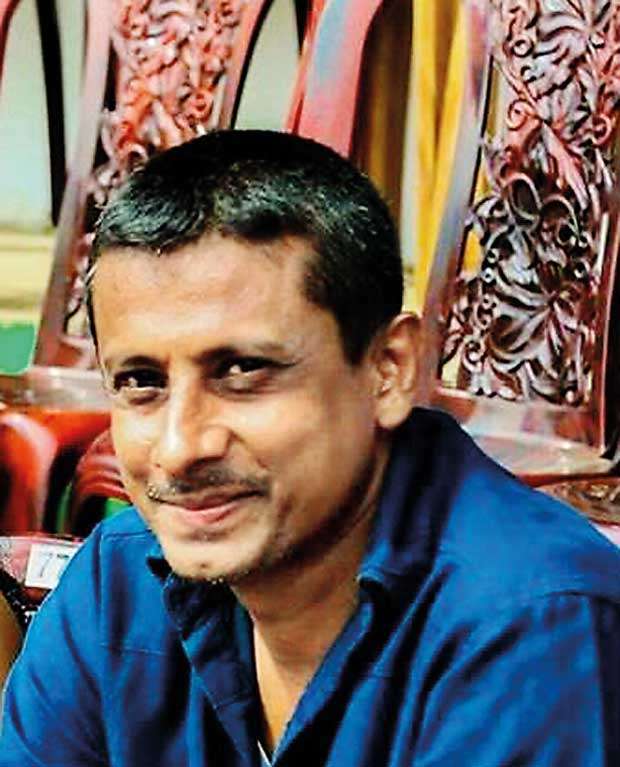22 Nov 2018 - {{hitsCtrl.values.hits}}

 ‘Do we need any foreward when we all cry over the farewells in life’, Sanjeewa Moonamalpe captures the reader with these lines as the foreward of his poetry collection ‘Obata Nowe Batiththanta’ (Not for you, for Chaffinches). Going along with the philosophy of Jean-Paul Charles Aymard Sartre he brings out existentialism throughout his poetry. All throughout the collection the concept of nothingness is felt. The very first poem ‘Rasawaththu Sallalayoo Wooha’ (Those who enjoyed turned into wanderers) focuses on how alcohol and weed has seeped in to the lives of those who are drenched in tears of heartbreak and the suffering of life. Those who suffer will always suffer through and the struggle will never be ending.
‘Do we need any foreward when we all cry over the farewells in life’, Sanjeewa Moonamalpe captures the reader with these lines as the foreward of his poetry collection ‘Obata Nowe Batiththanta’ (Not for you, for Chaffinches). Going along with the philosophy of Jean-Paul Charles Aymard Sartre he brings out existentialism throughout his poetry. All throughout the collection the concept of nothingness is felt. The very first poem ‘Rasawaththu Sallalayoo Wooha’ (Those who enjoyed turned into wanderers) focuses on how alcohol and weed has seeped in to the lives of those who are drenched in tears of heartbreak and the suffering of life. Those who suffer will always suffer through and the struggle will never be ending.
In a rich man’s war, how the lives of others are exploited by the forces of war, poverty and depression is conveyed through the poem ‘Maragena Marena Sahodariyakata’ (Suicide bomber who is a sister). This touches the life of ‘Thamilini Jeyakumaran’ who was once a LTTE terrorist. A paragraph from her autobiography runs throughout the poem bringing forth the needlessness of war. How the rich man’s war being fought by the youth of a nation, divided and lost. The end lines of the poem touch the reader’s human emotions in a scale unexpected. The understanding that the reader and the terrorist are one and the same, humans at the base level and oppressed by the dominators of a society. The understanding between the writer and the terrorist goes beyond the traditional borders of understanding into the landscape of loss and humanity.
‘James Ayya’ (Brother James) comes into the landscape of poetry through his life and philosophy. The theme ‘Nothingness’ again runs throughout the poem. This time though it highlights the bare essential needs of a human fulfilled in a daily manner personifying the general public of a nation. Living for their daily bread, fulfilling the dreams of their children and family while their own dreams fade away into the horizon.
With that the writer moves further into the world of passionate desires in the poem ‘Hangum Pipireemak’, (Bursting of Emotions) and expresses the longing over desires once fulfilled and love long lost. Sanjeewa Moonamalpe puts the last touches for his poetry collection through the poem ‘Boho Kalakata Pasu’ (After a long time) with the nostalgic feelings over the concept of time.
In loneliness memories awaken with the human emotions felt long time ago, loneliness is a nostalgic lover tormenting a broken heart. This is symbolized through the empty sky without the moon or the stars. Again, highlighting the concept of ‘nothingness’ throughout the human life in the poem ‘Gewunu Digu Siwu Raya’ (Long nights gone).
Existentialism is brought forth deeply in the poem ‘Warella math ekkama windawanna’ (Come suffer with me). In a world where moon light is admired for its beauty, chirping of birds as music, the writer sees otherwise. Writer sees the dullness in moonlight and the wailing of the birds bringing forth the wailing of the human soul suffering throughout a lifetime. Wind is felt as a repulsive feeling enhancing the emptiness of life. This emptiness and dullness the writer feels, runs throughout the poem highlighting the nothingness in life.
A brother’s love is as deep as a father’s love. ‘Loku Ayyata’ (For elder brother) poem paints the love of an elder brother in the minds of the reader.
Letting go of his own dreams, as an elder brother he builds the dreams of his siblings and even at the last moment of his life how he lets go of his last breath in the same manner embracing life with the understanding that another journey begins with death. All throughout this poetry collection this philosophy towards life is emphasized.
‘Bindu Mihirathi Mathaka Kabilith’ (Sweet memories broken), touches on the memories in the inner conscious recalled by the present. According to the writer nothingness prevails everywhere in life so everything which calls for these memories are gone. And the memories itself are hidden in the deep corners of one’s heart. Wailing for a love long lost and gone is recalled by the memories and the narrator is tormented by this. The poem ends with the question where the narrator addresses the person he loved, if she also recalls the same memories with the presence of today.
‘Ee Wiyali Bo Patha’ ( That dried Bo leaf), takes us on a journey where we also used to press ‘Bo Tree’ leaves within the pages of our books. The narrator uses this nostalgic remembrance of a Bo tree leaf to recall the memories of a love long lost gone.
Again, the concept of nothingness is beautifully crafted throughout this poem. The symbols and metaphors go along with the line of the concept of nothingness.
Just like a name written on a Bo tree leaf forever craved in the heart, life melting away like a cube of ice on hand, separation from the person the narrator loved and the name also fading away like dust, are beautiful symbols of a love past gone.
The peak of the poem is at the moment when the narrator accidentaly meets the person he loved, on the streets going for work. Shock waves of remembrances are passing through him and the only thing he feels is the unbearable loneliness. And just like the name carved on the Bo tree leaf the same name is carved on the walls of his heart never letting go of him in emotions and memory.
Boho Kalakata Pasu Rambukkana Dumriya Nawathumedi’ (After a long time at the Rambukkana Train Station) is where the narrator observes the person, he loved looking at him expectantly. The reader realizes this only at the end of the poem. The fruitfulness and the uselessness of these expectations of love are conveyed through the stanzas before the end of the poem. Again, the writer uses symbolism to convey this message.
‘Isaw’ (Locations), is another one of the writers exquisite craftsmanship impacting our imagination.
The narrator meets the person he loved on streets filled with dust and recalls how they used to share a lunch packet sitting in an area filled with trees, fallen dry leaves and love. Just like the fallen dry leaves this love also faded away. Which is like a foretelling of the future within the presence. With the sudden meeting on the streets, the narrator is struck by the lightning of the eyes he once knew, eyes he once so endearingly loved. Yet again they part ways like the dust in the wind.
‘Boho Kalakata Pasu Rambukkana Dumriya Nawathumedi’ (After a long time at the Rambukkana Railway Station) is where the narrator observes the person, he loved looking at him expectantly. The reader realizes this only at the end of the poem. The fruitfulness and the uselessness of these expectations of love are conveyed through the stanzas before the end of the poem. Again, the writer uses symbolism to convey this message. Dew drops giving up on their lives and kissing the earth, river with its ripples loving the fish in the water and the lake embracing the lake flowers with tender warm love are these contradictions between love lost and love expectant.

Sanjeewa Moonamalpe
In the poem ‘Obata Nowe Batiththanta’ (Not for you, for the Chaffinches), the narrator conveys his longing to be free as a bird traveling into the vast horizon of the sky letting going of all the norms in life.
With that the writer moves further into the world of passionate desires in the poem ‘Hangum Pipireemak’, (Bursting of Emotions) and expresses the longing over desires once fulfilled and love long lost. Sanjeewa Moonamalpe puts the last touches for his collection of poems through the poem ‘Boho Kalakata Pasu’ (After a long time) with the nostalgic feelings over the concept of time. The narrator paints a landscape where time is of no essence at all. Even though time might be of use for a waterfall, rain, wind and the coldness that changes with time, for the narrator it is of no significance at all.
The concept of nothingness running throughout the collection of poems, the writer brings in the last poem as the essence of the whole collection of poems. The narrator is at a standstill point in life and wishes for the memories to burn away and in the end asks of time to let go of him as he no longer wishes to run with time. Sanjeewa Moonamalpe has done justification for the meaning and essence of life.
30 Nov 2024 2 hours ago
30 Nov 2024 3 hours ago
30 Nov 2024 4 hours ago
30 Nov 2024 6 hours ago
30 Nov 2024 9 hours ago